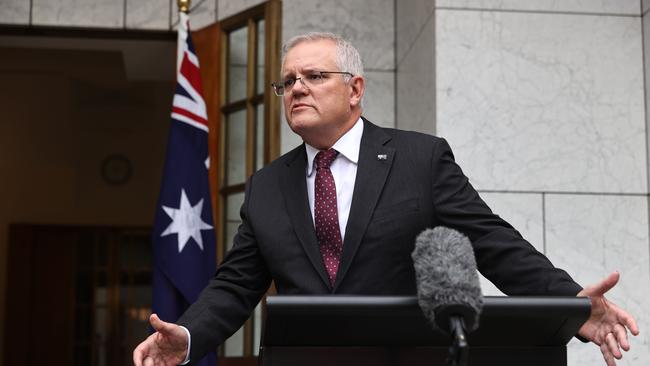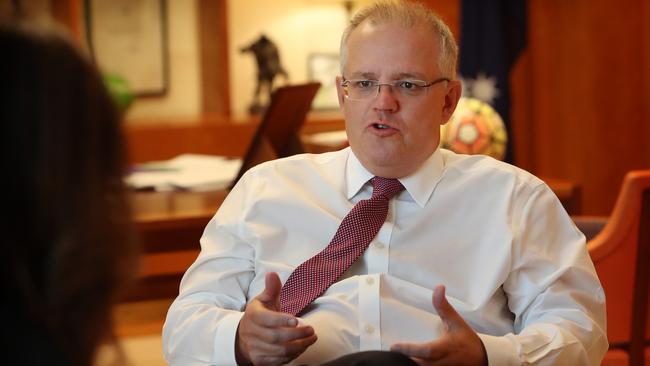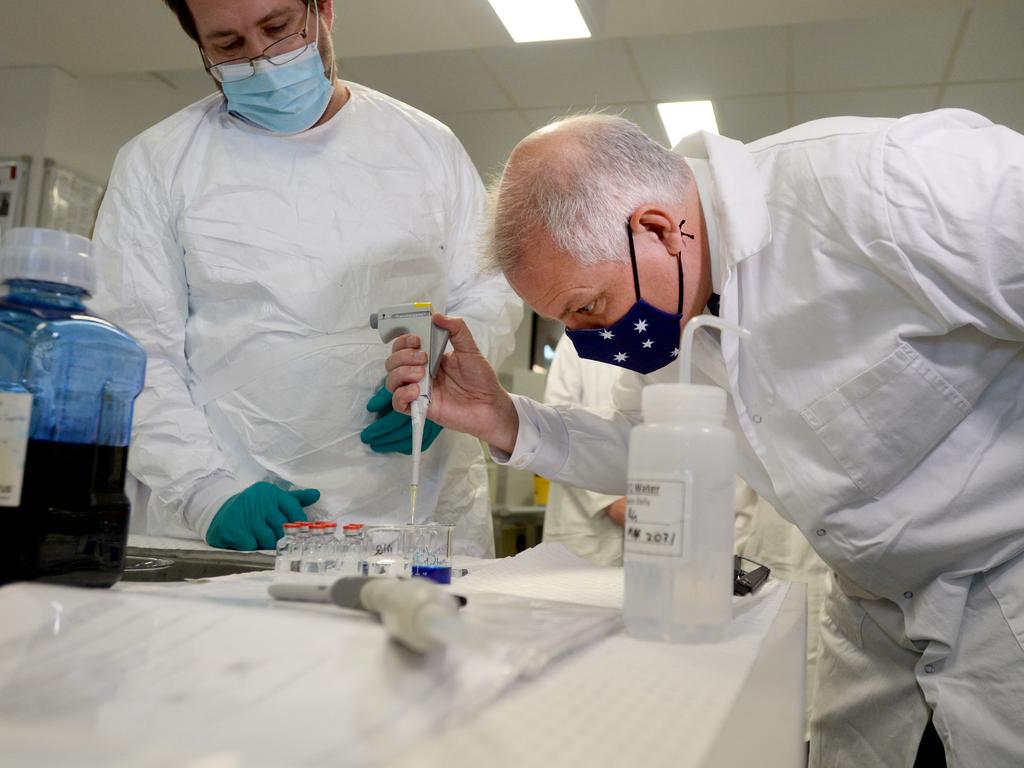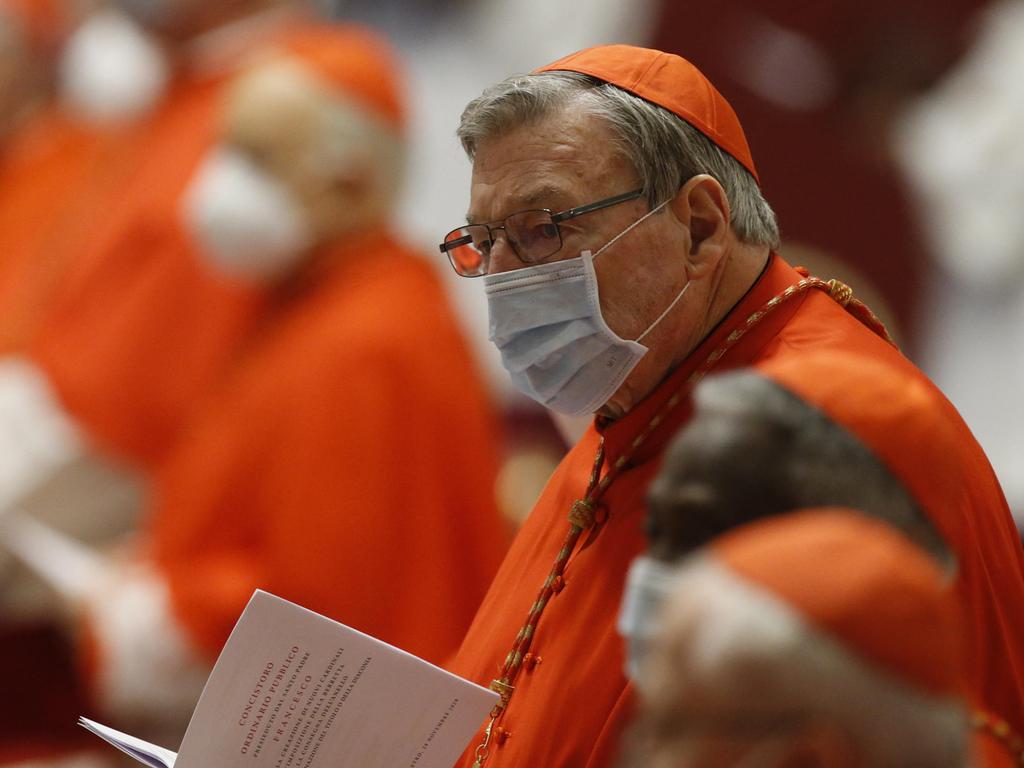‘Pragmatist’ Scott Morrison can’t rely on more politics over policy
Few leaders have experienced the extremes. The nation is still working out what Scott Morrison stands for as a leader.

Few leaders have experienced the extremes of political life in the short time that Scott Morrison has since becoming Prime Minister. In less than three years, Morrison has enjoyed a “miracle” election win, let the country down during the bushfires crisis, and stepped up to the plate to show leadership during the pandemic, only to succumb to blame-shifting in the latter half of last year.
You could be forgiven for thinking that a political leader would learn much from such experiences. An overseas observer also could be forgiven for thinking that the Prime Minister in charge of the vaccine rollout and response to the misogynistic culture in parliament was a clueless novice.
If anything, Morrison has over-learned in some areas. Having been criticised for a lack of empathy during the bushfire crisis, he made a ham-fisted attempt to empathise with former Liberal staff member Brittany Higgins, who alleged a colleague raped her in 2019 in the office of Linda Reynolds, the defence industry minister at the time. Using conversations with his wife, Jenny, backfired badly, even though men the world over could probably relate to the process he went through when doing so. It was left looking like a tactic by a leader unable to empathise without the help of his wife.
Even if the empathy had come more naturally, though, it is no guide to public policy — as Australia’s refugee policies amply demonstrate. A clear statement that every Australian is entitled to a safe workplace would have sparked a much more productive conversation than once again using his family as political props.
Morrison told us the biggest thing he learnt during the pandemic was to listen. Quick to also highlight that listening was a skill he’d honed throughout his political career, Morrison’s point was that the pandemic heightened his understanding about the importance of listening to people’s concerns. Yet in recent months he took too long to hear the concerns of women and played a political blame game with the states over the delayed vaccine rollout — a delay that brings the government’s management abilities into question. That slowness to respond has left him more vulnerable as a political leader than at any time during his prime ministership. The damage done will take time to repair. Time Morrison doesn’t have a lot of as we count down to the next election.
Political chameleon
Being in power suits Morrison. He didn’t take long to adjust to the prime ministership in the second half of 2018. He was assisted by the fact, due to the proximity of the 2019 election, there was no great expectation that he would put his stamp on government.
At the time neither Morrison nor his supporters would have been too sure what that stamp might have been. Still, he is an effective if not inspiring communicator and, while he doesn’t always show it, he can master policy detail across the breadth of government, having been treasurer for almost three years and a cabinet minister for almost five. Great changes would not have been credible once he assumed the leadership; indeed, based on his record, great changes to policy were highly unlikely as well.

Fortunately, unlike Malcolm Turnbull, Morrison didn’t need to justify the change of leadership with changes in policy because he allowed others to publicly undermine his predecessor.
Yet, for all his time in parliament, Morrison can come across as a political chameleon.
With experience in immigration, social security and the Treasury before achieving the leadership, Morrison had demonstrated toughness, at least so far as government conservatives understood the concept.
As a minister, Morrison was a team player implementing the party’s preferences in a way that rarely brought him into direct conflict with Tony Abbott or Turnbull.
As a leadership aspirant he was thought to be a realist, not an ideologue, who understood the need to reset the government’s rhetorical approach before the election, rather than rebut the government’s direction. This was the Morrison Labor found hard to pin to the wall in the 2019 election.
He could escape blame for the government’s failings by demonstrating fresh leadership and a more appealing popular face than either of his predecessors. He could mollify the party by concentrating on the election instead of the differences that had annihilated Abbott and Turnbull. And he only had to be more popular than Bill Shorten. Morrison could do none of those things after the election, but a win brought with it an authority all its own.
Morrison’s minimalist approach to prime ministerial leadership was successful at the election. Over the next year, though, his enemy was not to be the opposition but fire and plague.
The trials to come would require something more than transactional leadership. To face its greatest crises in 70 years, Australia had Morrison.
Climate cowardice
One of the great unknowns of Morrison’s prime ministership will always be the way he would have handled COVID-19 had his political antibodies not been pounded by his poor handling of the bushfires.
Where the election had tested his raw combativeness, the fires showed how much more was required of a leader than gladiatorial skill. Morrison was found deeply wanting.
Where Paul Keating would consciously flick the switch to vaudeville, Morrison seemed to be all stagecraft. He would have to show that policy was something more than theatre.
The fires exposed much more than Morrison’s inadequacy as a leader. Morrison had learnt the wrong lessons from previous Liberal leaders about the balance between populism and vision. The former is the price a leader pays to govern in a democracy. The latter marks one out as exceptional. Prime ministers need it regardless of whether they wish to flaunt it.
If Morrison failed to show empathy during the bushfire crisis, another personal quality was certainly on display. Boy, is he stubborn. It’s one of the reasons why the description of him as pragmatic doesn’t sit as well as it otherwise might. Pragmatists change their mind. Promoting a policy, changing your mind and still being seen as principled is a rare political skill. Digging in is more common.
If ever a crisis was an opportunity, the fires provided Morrison a chance to become a proselytiser for action on climate change. He could have adopted a position with growing political support.

His previous policy caution would have become a virtue — accepting the need for change while empathising with those working in industries set to decline.
Even though Anthony Albanese showed outstanding leadership during the fires, Labor has its own demons on climate change. Still frightened of its 2013 shadow, Labor in 2020 revealed plans to go to the next election without an emissions reduction target for 2030. Instead, it will have an aspirational target for 2050.
It is widely believed in Labor circles that Shorten’s 2030 target was a key factor that cost him the 2019 election.
This may be the case, but climate policy has changed since then and Labor seems to have forgotten one important thing: if it wins the next election without a 2030 target, which naturally then becomes the new Labor government’s policy, Australia will be in violation of our Paris Agreement emissions targets.
For a party that claims to do better than the Coalition on the environment and climate change, it’s a weak approach.
Despite the bushfires, it seems likely that Australia is headed towards bipartisanship on climate policy. A bipartisanship of cowardice. A national consensus on effective climate policy may seem a distant possibility.
It has happened before in Australia, though, and in countries with similar political systems — if not similar economic profiles — to our own.
A time to lead
It’s not entirely clear that Morrison learnt as much about leadership from his failures during the bushfire crisis as he should have. It may have been that the circumstances of the pandemic better suited his approach to leadership.
Failure to identify, much less learn from, their mistakes cost Kevin Rudd and Tony Abbott their prime ministerships. As a leader with a lot of decisions to make and explain, Morrison could not afford to appear out of reach alongside Albanese’s accessibility.
During the bushfires Albanese cleverly contrasted the Prime Minister’s disappearance with his presence on the ground. It was a useful head start within his first year as Opposition Leader.
But once the pandemic hit and a reversion to executive dominance became inevitable, Australian politics changed. Morrison maintained his accessibility with regular appearances on talkback radio and morning television — giving him the chance to talk football and family between pandemic updates.
But he also let the office of prime minister elevate him, which left Albanese looking like the barfly rather than the alternative leader.
For perhaps the first time in his political career, it was on the substance of his policies that Morrison depended for his success in 2020. After fire and disease, dealing with the ongoing economic crisis should have found the Coalition on more secure political ground.
The political environment had changed, though. Just as the public was expecting more of politicians, Morrison seemed keen to revert to business as usual.
What, though, would business as usual look like once the emergency period was over? Could a leader who put such faith in scientific expertise continue to entertain the delusions and conspiracy theories popular among his own government and supporters? Or would he revert to his populist instincts and blow a once-in-a-lifetime chance to lead?
This is an edited extract from How Good is Scott Morrison?
by Wayne Errington and Peter van Onselen, published by Hachette Australia on April 14.




To join the conversation, please log in. Don't have an account? Register
Join the conversation, you are commenting as Logout